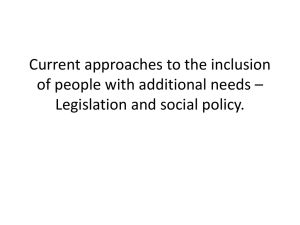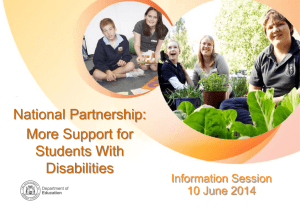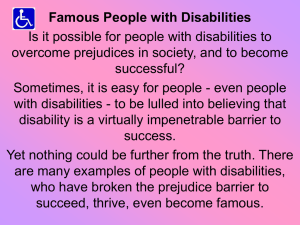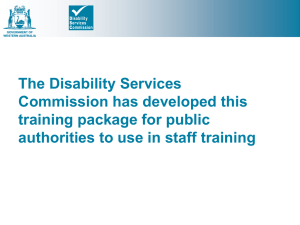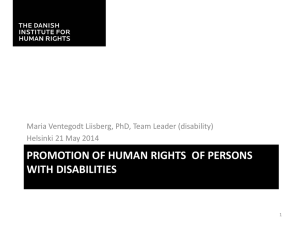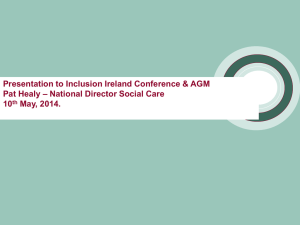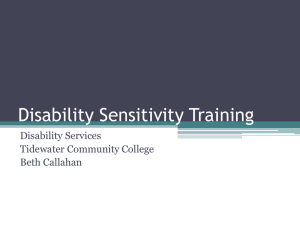disability servcies and croke park
advertisement
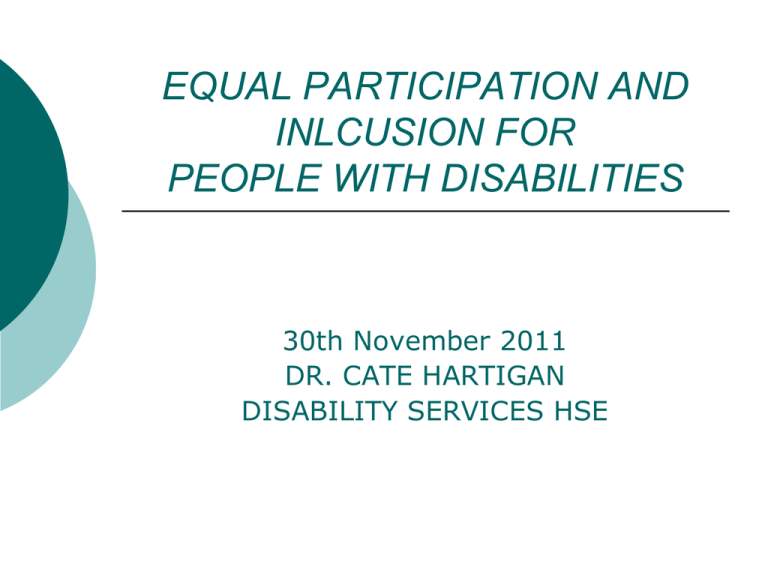
EQUAL PARTICIPATION AND INLCUSION FOR PEOPLE WITH DISABILITIES 30th November 2011 DR. CATE HARTIGAN DISABILITY SERVICES HSE PRINCIPLES “Every person with a disability would be supported to enable them, as far as possible, to lead full and independent lives, to participate in work and in society and to maximize their potential” - Towards 2016 People with Disabilities need Flexible supports to suit individual needs though the use of mainstream local services To do ordinary things in ordinary places More opportunities for families to play their part in supporting their family member Summary of Key Themes emerging from the Review of Disability Policy POLICIES UN Convention on the Rights of Persons with Disabilities, 2009 National Disability Strategy, 2004. This provides the overarching framework for legislative and policy development. (The Disability Act 2005, the Education for Persons with Special Educational Needs Act 2004, The Health Act (HIQA) 2007 and the Citizens’ Information Act 2007). The emerging DoH policy direction (Value for Money and Policy Review), CURRENT ISSUES HSE Disability Service Governance National Consultative Forum Budget Inspection and Registration 0-18 reconfiguration Implementation of “Time to Move on from Congregated Settings” Resource Allocation Model Cure or Care Model VALUE FOR MONEY From existing resource by Moving away from over-medicalised and professionalised models of care Moving to more flexible models of support focused on greater independence of individuals Introducing a transparent system of resource allocation This would result in more efficient use of resources, and better value from the monies invested in terms of individuals' quality of life (NDA) PENDING REPORTS VFM & Policy Review New Directions-Personal Supports for Adults with Disabilities Residential/Respite Care with Host Families Review of Autism HSE Challenges Basic management accountability lacking Governance and management process variable Crisis management dominates Decision making processes unclear Data unavailability ICT systems platforms unfit for purpose Many people committed but overburdened IMPLEMENTATION PLANNING Governance Structure Health Service Executive Board DoHC Cross Sectoral Working Group Integrated Service Directorate National Disability Governance Group New Directions National Consultative Forum National Implementation Group Congregated Setting Service User New Directions 4 Regional Consultative Fora Regional Implementation Group Congregated Setting Service User New Directions Local Consultative Fora (17 bases on Service Areas) Local Implementation Groups Congregated Setting Service User What is to be done? Value for Money and Policy Review Improving Primary and Community Care provision National processes-equity of access From congregated to community From segregation to inclusion Skill mix Shared services Commissioning/Tendering What is to be done? Leadership Stop doing some of what we are doing Innovation, do some thing's differently Collaboration, non-statutory providers and State agencies Early intervention and prevention Person centred provision Emphasis on cultural change rather than structure Reform: ‘Continuous Discontinuous Change’ “Where organisations have to cope with many simultaneous and interactive changes, reacting to changes in strategy, structure and downsizing, all of which are stressful and can result in resistance by employees” (Marks 2007) Health and Personal Social Services have to implement New strategies New Policies New Legislation New Technology Concurrently with politically driven organisational reform and Keeping the “show on the road”

